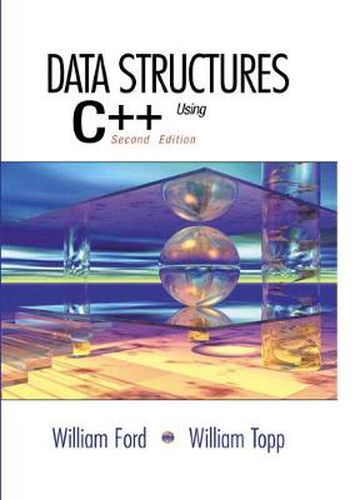Readings Newsletter
Become a Readings Member to make your shopping experience even easier.
Sign in or sign up for free!
You’re not far away from qualifying for FREE standard shipping within Australia
You’ve qualified for FREE standard shipping within Australia
The cart is loading…






This long-awaited second edition of Data Structures with C++ Using STL, by Professors Ford and Topp, provides a modern object-oriented approach to data structures using the model of the Standard Template Library (STL). The authors unify the study of data structures around the concepts of containers and iterators. The book skillfully develops algorithms for the data structures and their applications. Readers will find a systematic and detailed implementation for each data structure. These successful authors offer a learning tool that is motivated by a wealth of excellent examples and complete running programs. KEY FEATURES *Uses the early chapters to present object design and programming principles that are at the core of data structures. *Develops clear and concise templates, which can support generic programming throughout the book. *Uses the STL container classes throughout the book. *Presents an Application Programming Interface (API) for each STL container and immediately uses it to solve problems. *Demonstrates the implementation of the STL classes by developing mini-container classes that use the corresponding STL interface. The student can understand the overall design of the container and its C++ implementation code. *Includes and intuitive and precise introduction to iterators that are at the core of modern data structures. *Covers with the same careful style advanced topics such as red-black trees, hash tables, heaps, and graphs. *Provides the reader with an extensive development of advanced recursion and inheritance as applied to data structures. *Makes available valuable pedagogical features including chapter objectives and summaries; many complete programs with runtime output; case studies; review exercises with solutions for each chapter; extensive written and programming exercises; and a programming project for each chapter. *Supplement: Instructor CD with solutions and a test item file; Companion Website containing language tutorials, students assessment materials, and PowerPoint slides.
$9.00 standard shipping within Australia
FREE standard shipping within Australia for orders over $100.00
Express & International shipping calculated at checkout
This long-awaited second edition of Data Structures with C++ Using STL, by Professors Ford and Topp, provides a modern object-oriented approach to data structures using the model of the Standard Template Library (STL). The authors unify the study of data structures around the concepts of containers and iterators. The book skillfully develops algorithms for the data structures and their applications. Readers will find a systematic and detailed implementation for each data structure. These successful authors offer a learning tool that is motivated by a wealth of excellent examples and complete running programs. KEY FEATURES *Uses the early chapters to present object design and programming principles that are at the core of data structures. *Develops clear and concise templates, which can support generic programming throughout the book. *Uses the STL container classes throughout the book. *Presents an Application Programming Interface (API) for each STL container and immediately uses it to solve problems. *Demonstrates the implementation of the STL classes by developing mini-container classes that use the corresponding STL interface. The student can understand the overall design of the container and its C++ implementation code. *Includes and intuitive and precise introduction to iterators that are at the core of modern data structures. *Covers with the same careful style advanced topics such as red-black trees, hash tables, heaps, and graphs. *Provides the reader with an extensive development of advanced recursion and inheritance as applied to data structures. *Makes available valuable pedagogical features including chapter objectives and summaries; many complete programs with runtime output; case studies; review exercises with solutions for each chapter; extensive written and programming exercises; and a programming project for each chapter. *Supplement: Instructor CD with solutions and a test item file; Companion Website containing language tutorials, students assessment materials, and PowerPoint slides.